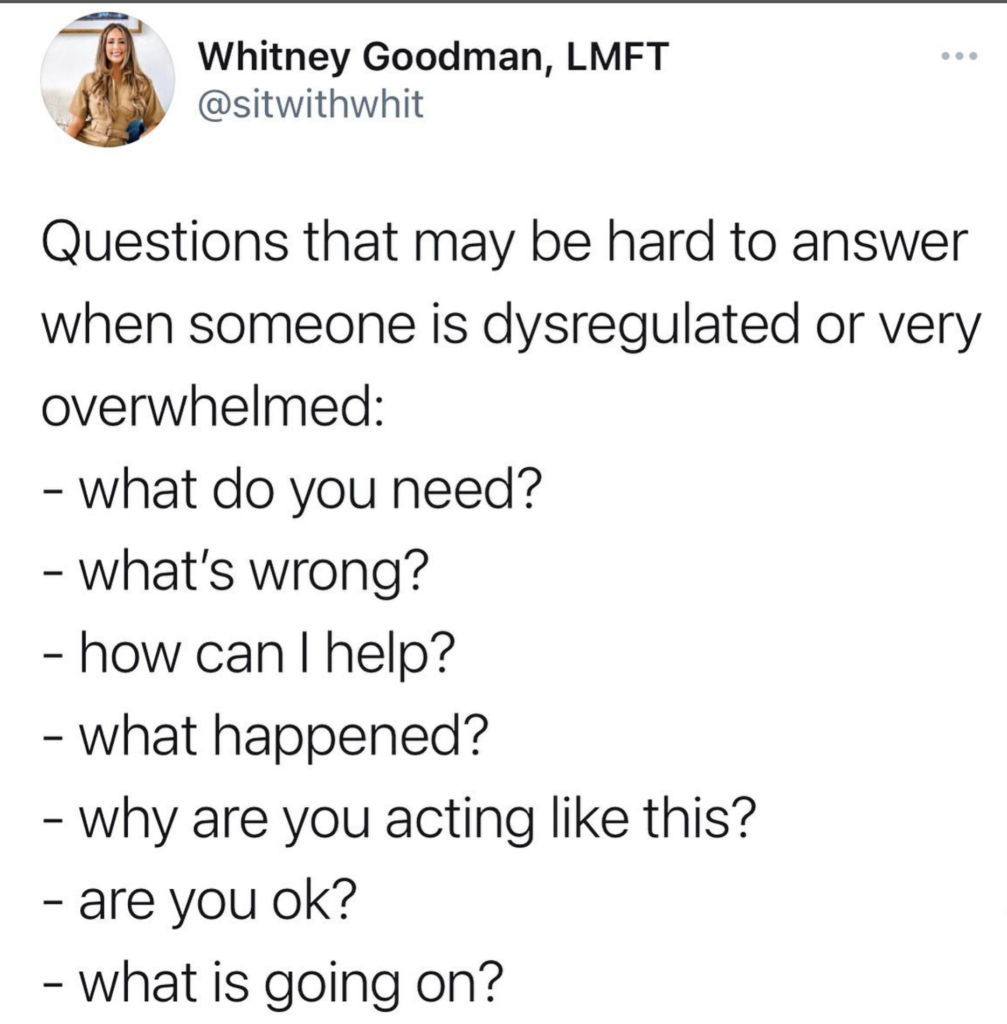Triggered: What To Say And Do When You’re Emotional
March 2, 2022
“I’m Triggered” Is A Popular Phrase, But What Does It Actually Mean?
Triggered has become a very popular adjective over the years and the meaning has gotten super watered down…
So, I like to use emotional flooding as a solid definition for getting “triggered.”
According to Dr. John Gottman, emotional flooding is our nervous system in overdrive.
It happens in our relationships when someone says or does something that sets off your internal threat-detection system. It happens when you’re reminded of something from your past or when you experience something distressing. You can think of emotional flooding as that cascade of symptoms that happens when you’re confronted with a trigger (real or imagined).
Your sympathetic nervous system jumps into action, preparing you for battle or flight. In this state, you lose some of your capacity for rational thought and there is a decrease of activity in your prefrontal cortex, the center of higher cognition. It is not possible to ‘reason’ traumatized people out of feeling overwhelmed when their bodies are experiencing strong body-based responses. We must recognize when we are emotionally flooded and work on creating safety, before reasoning and understanding.

Signs That You’re Getting Triggered
Creating awareness about your own personal symptoms of emotional flooding is very important. The more aware you are that you’re becoming flooded, the more likely you will be able to calm your nervous system and communicate effectively.
Some common symptoms of emotional flooding are:
- tunnel vision or trouble seeing
- compromised hearing
- sweating
- upset stomach
- muscle tightness
- rapid heartbeat
- emotions feel all over the place
- difficulty focusing or processing information
- feeling like you want to flee or run
What To Say When You’re Feeling Triggered
It can be really hard to do anything when you’re emotionally activated. Communication becomes especially difficult and this is why I recommend having a plan in place first.
Here are some things you can discuss with the people close to you (most helpful to do this when you’re feeling calm):
- I usually feel triggered when ______ happens.
- These are some signs I am emotionally flooded: _____________________
- When I am emotionally flooded I feel it in my body. This is what is happening: ___________________.
- When I am emotionally flooded, sometimes I say things like:______________________________________.
- If you notice I am emotionally flooded, you can help me by: ______________________________________.
- When I am ready to talk or connect again, I will show you by: _____________________________________.
Answering these questions for yourself and having discussions about these topics with the people close to you can be extremely helpful. You’ll be way more prepared when a triggering event happens.
How To Self-Regulate When You’re Feeling Triggered
Self-regulation is what you can do while you’re feeling triggered. It is a set of skills that allow us to regulate our emotions and decrease feelings of distress. These conscious or unconscious mechanisms reduce our level of pain and re-establish our equilibrium.
Developing self-regulation strategies is possible at any age. It begins with becoming aware of where we go with our feelings, thoughts, and actions when feeling discomfort or pain. Then we can make deliberate choices to develop new, useful strategies.
You can use this list as a starting point to develop your own self-regulation toolkit.
- caring, understanding self talk that affirms feelings
- self expression through art, music, dance, writing, etc.
- prayer
- body movement
- focusing on the breath
- cross your arms across your chest and alternate tapping each shoulder
- compassionately label your emotions
- realistic, positive self talk that empowers
- becoming aware of your body sensations
- nutrition
- take a walk
- listen to music
I recommend keeping a list on your phone or somewhere easy to access with several things you can do/use when you’re feeling triggered. You want to make this as easy as possible for yourself because when you’re overwhelmed it will be ten times harder to think about.
Getting Triggered Happens To The Best Of Us
Everyone will become emotionally flooded from time-to-time. The most important thing to remember is that you can get through it, you can prepare for it, and you can learn to reduce the severity over time. The more prepared you are for these moments, the easier they will get, and they will likely decrease as you gain more self-regulation strategies. Working with a therapist can also be a great way to learn more regulation skills, talk about your emotional distress, and get to the root of what is causing the emotional flooding.
WANT MORE LIKE THIS?
I have an entire course dedicated to learning about triggers, trauma responses, and how to support people who have been through trauma. You can learn more about my Heal Together course here.
I also have an email list (so you never miss anything!) and a book. You can also find me on Instagram, Twitter, and TikTok!
The best advice is to go to therapy when you know your emotional triggers will be flooded with emotion. You know the players, the scenario and the reaction. You will be prepared. I was. It was amazing that when it happened, and I didn’t know exactly what it would be, I sat there calm and assured I would make it through. And I did! It was the preparedness. “The plays the thing – the players on the stage repeat their parts. Sit back and watch the show!” Shakespeare.
You’ll be ready.
You took care of yourself in advance after too many bad experiences and emotional moments.